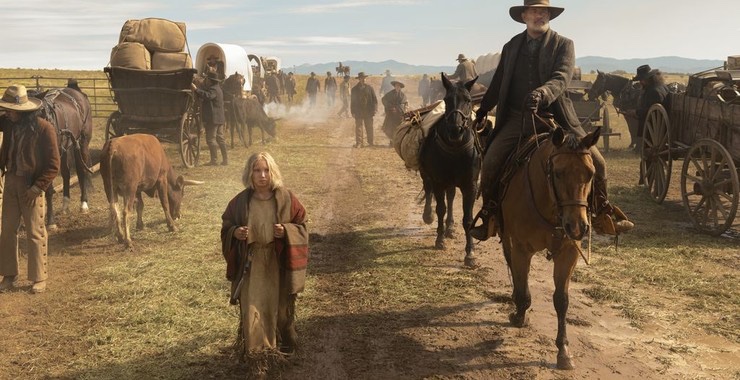NEWS OF THE WORLD
Universal Pictures
Reviewed for Shockya.com & BigAppleReviews.net linked from Rotten Tomatoes by: Harvey Karten
Director: Paul Greenglass
Writer: Paul Greengrass, Luke Davies, based on the novel by Paulette Jiles
Cast: Tom Hanks, Helena Zengel, Michael Angelo Covino, Ray McKinnon, Marc Winnigham
Screened at: Critics’ link, NYC, 12/17/20
Opens: December 25, 2020

When I was a kid, say 9 years old, I couldn’t get enough of Westerns on TV and in the movies, though in a recent interview Tom Hanks said “they don’t make Westerns any more.” My favorite heroes were Gabby Hayes, who played a toothless, bearded gent for comic relief; Tom Mix, Hopalong Cassidy and the Lone Ranger. Every story of the Lone Ranger and his faithful Indian scout Tonto, ended with “Hi Yo Silver. Away!” Its only classic notion was the theme music from the overture to the opera William Tell, which I always use first to introduce high school kids to classical music.
Occasionally a Western had real class, with “High Noon” standing so far above the rest that it stayed in my mind as the Greatest of the genre. Westerns today are so rare that “News of the World” can be welcomed indeed. It may or may not have resonance with twelve-year-olds today, though there’s a good chance that one of the two principal actresses, Berlin-born is Helena Zengel, a 12-year-old playing a Johanna Leonberger, may connect with them. Kids today may marvel that she can speak English, German and Kiowa—that last word taken from an Indian tribe that originated in Western Montana and whose name means “principal people.”
We’ve come a long way from the Sergio Leone spaghetti westerns and any of that genre that portrayed Indians as the bad guys, whooping it up on battle and taking white scalps to show their courage. In these older westerns the U.S. cavalry were the good guys who arrived in the nick of time to save a family, announcing their courageous entry with blasts of the bugle.
In this drama, Tom Hanks in the role of Captain Jefferson Kyle Kidd in the year 1870 in northern Texas, now makes a living reading newspapers in towns where the people either had no newsstands and were probably illiterate. They were interested in news of their area, though later in the story they would find not only amusement but incitement when Captain Kidd, suddenly turning Marxist, reads to the people of Pennsylvania miners who fought back against their bosses, who were not particularly concerned about the yearly deaths of these employees.
The story turns on the relationship between the Captain and the blond child, the latter having lost her parents via an Indian raid, was adopted by the tribe where she learned the Kiowa language, and has only a rudimentary understanding of German. In fact when Kidd, who finds her and dedicates himself to taking her to her aunt and uncle (whom she hated), refuses to identify herself as Johanna, instead taking her Kiowa name, Cicada.
The road movie involves the growing bond between a man in his sixties and an anxious girl over three-score years his junior. As they ride toward the relatives, they run into problems. The first involves a trio of bad guys with rifles who try to buy the girl from the captain for fifty dollars, set on making money by pimping her out. When he refuses, they chase him. In the story’s best action sequence, the captain has to take out all three, which he does using advanced military strategy of its time—with the help of the girl who in a later action scene saves him again.
The movie has resonance today as the solitary captain, wandering from town to town to deliver the news, finds a tree where a Black man has been lynched, a note on the body inscribed “Texas says no. This is White man’s Country.” When the captain and his young charge ride through a no-man’s land, they find a town seemingly owned by Farley (Thomas Francis Murphy), who brags about how he lorded over the Indians, Mexicans, and Blacks. (Guess who would play Farley most realistically today!) Buffalo bodies are strewn across the land. (Remember them? There must be a few remaining).
Paul Greenglass, who directs and co-wrote, may be best known today for films of greater action such as “Jason Bourne” and “The Bourne Ultimatum,” here settling down to concentrate on the bonding experience of man and girl. We all know that Tom Hanks can do no wrong, but we take surprise in the energy cast by young Zengel, who is both vulnerable and fierce, resisting the adult at first based on her memories of older people, and of course yielding to the love that she feels for her new adopted dad.
Here the actions scenes might be considered a temporary relief from the quiet seriousness, but both action and sentiment are conveyed with authenticity as is the cinematography by Dariusz Wolski in the proud blue state of New Mexico.
118 minutes. © 2020 by Harvey Karten, Member, New York Film Critics Online
Story – B+
Acting – A-
Technical – B+
Overall – B+
